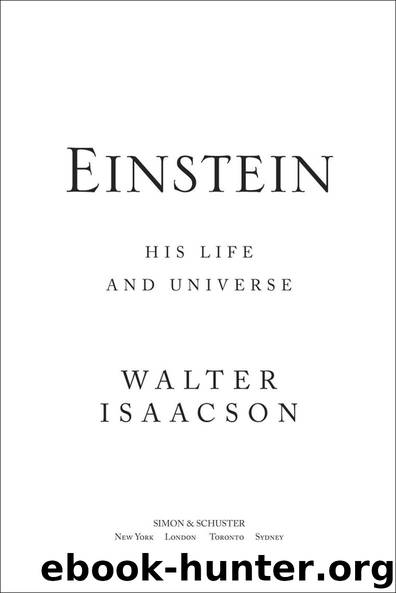Einstein by Isaacson Walter

Author:Isaacson, Walter [Isaacson, Walter]
Language: eng
Format: epub, mobi
Publisher: Simon & Schuster
Published: 2007-04-10T07:00:00+00:00
Wresting Principles from Nature
In his more radical salad days, Einstein did not emphasize this credo. He had instead cast himself as an empiricist or positivist. In other words, he had accepted the works of Hume and Mach as sacred texts, which led him to shun concepts, like the ether or absolute time, that were not knowable through direct observations.
Now, as his opposition to the concept of an ether became more subtle and his discomfort with quantum mechanics grew, he edged away from this orthodoxy. “What I dislike in this kind of argumentation,” the older Einstein reflected, “is the basic positivistic attitude, which from my point of view is untenable, and which seems to me to come to the same thing as Berkeley’s principle, Esse est percipi.”*38
There was a lot of continuity in Einstein’s philosophy of science, so it would be wrong to insist that there was a clean shift from empiricism to realism in his thinking.39 Nonetheless, it is fair to say that as he struggled against quantum mechanics during the 1920s, he became less faithful to the dogma of Mach and more of a realist, someone who believed, as he said in his tribute to Maxwell, in an underlying reality that exists independently of our observations.
That was reflected in a lecture that Einstein gave at Oxford in June 1933, called “On the Method of Theoretical Physics,” which sketched out his philosophy of science.40 It began with a caveat. To truly understand the methods and philosophy of physicists, he said, “don’t listen to their words, fix your attention on their deeds.”
If we look at what Einstein did rather than what he was saying, it is clear that he believed (as any true scientist would) that the end product of any theory must be conclusions that can be confirmed by experience and empirical tests. He was famous for ending his papers with calls for these types of suggested experiments.
But how did he come up with the starting blocks for his theoretical thinking—the principles and postulates that would launch his logical deductions? As we’ve seen, he did not usually start with a set of experimental data that needed some explanation. “No collection of empirical facts, however comprehensive, can ever lead to the formulation of such complicated equations,” he said in describing how he had come up with the general theory of relativity.41 In many of his famous papers, he made a point of insisting that he had not relied much on any specific experimental data—on Brownian motion, or attempts to detect the ether, or the photoelectric effect—to induce his new theories.
Instead, he generally began with postulates that he had abstracted from his understanding of the physical world, such as the equivalence of gravity and acceleration. That equivalence was not something he came up with by studying empirical data. Einstein’s great strength as a theorist was that he had a keener ability than other scientists to come up with what he called “the general postulates and principles which serve as the starting point.”
It was a process that mixed intuition with a feel for the patterns to be found in experimental data.
Download
This site does not store any files on its server. We only index and link to content provided by other sites. Please contact the content providers to delete copyright contents if any and email us, we'll remove relevant links or contents immediately.
Hit Refresh by Satya Nadella(9128)
When Breath Becomes Air by Paul Kalanithi(8433)
The Girl Without a Voice by Casey Watson(7888)
A Court of Wings and Ruin by Sarah J. Maas(7823)
Do No Harm Stories of Life, Death and Brain Surgery by Henry Marsh(6940)
Shoe Dog by Phil Knight(5259)
The Rules Do Not Apply by Ariel Levy(4961)
A Higher Loyalty: Truth, Lies, and Leadership by James Comey(4958)
Hunger by Roxane Gay(4923)
Tuesdays with Morrie by Mitch Albom(4777)
Everything Happens for a Reason by Kate Bowler(4734)
The Immortal Life of Henrietta Lacks by Rebecca Skloot(4582)
Millionaire: The Philanderer, Gambler, and Duelist Who Invented Modern Finance by Janet Gleeson(4473)
How to Change Your Mind by Michael Pollan(4355)
All Creatures Great and Small by James Herriot(4314)
The Money Culture by Michael Lewis(4201)
Man and His Symbols by Carl Gustav Jung(4132)
Elon Musk by Ashlee Vance(4122)
Tokyo Vice: An American Reporter on the Police Beat in Japan by Jake Adelstein(3989)
